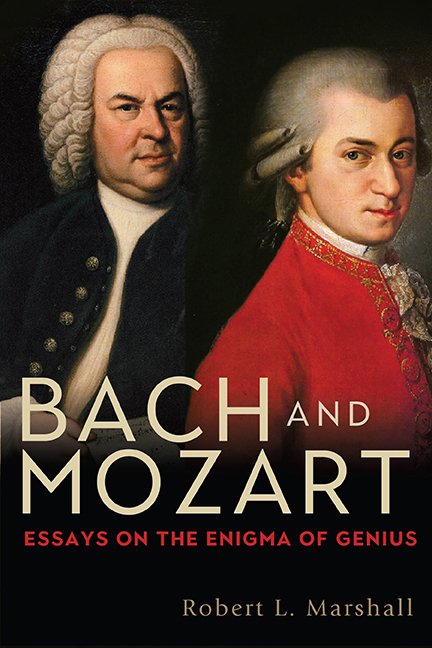Book contents
- Frontmatter
- Dedication
- Epigraph
- Contents
- List of Figures
- Preface
- List of Abbreviations
- Prologue. The Century of Bach and Mozart as a Music-Historical Epoch: A Different Argument for the Proposition
- 1 Young Man Bach: Toward a Twenty-First-Century Bach Biography
- 2 The Notebooks for Wilhelm Friedemann and Anna Magdalena Bach: Some Biographical Lessons
- 3 Bach and Luther
- 4 Redeeming the St. John Passion–and J. S. Bach
- 5 Bach's Keyboard Music
- 6 The Minimalist and Traditionalist Approaches to Performing Bach's Choral Music: Some Further Thoughts
- 7 Truth and Beauty: J. S. Bach at the Crossroads of Cultural History
- 8 Bach at Mid-Life: The Christmas Oratorio and the Search for New Paths
- 9 Bach at the Boundaries of Music History: Preliminary Reflections on the B-Minor Mass and the Late-Style Paradigm
- 10 Father and Sons: Confronting a Uniquely Daunting Paternal Legacy
- 11 Johann Christian Bach and Eros
- 12 Bach and Mozart: Styles of Musical Genius
- 13 Mozart and Amadeus
- 14 Bach and Mozart's Artistic Maturity
- 15 Mozart's Unfinished: Some Lessons of the Fragments
- Epilogue (ossia Postmortem). Had Mozart Lived Longer: Some Cautious (and Incautious) Speculations
- Notes
- Works Cited
- Index
- Miscellaneous Endmatter
- Eastman Studies in Music
12 - Bach and Mozart: Styles of Musical Genius
Published online by Cambridge University Press: 29 March 2020
- Frontmatter
- Dedication
- Epigraph
- Contents
- List of Figures
- Preface
- List of Abbreviations
- Prologue. The Century of Bach and Mozart as a Music-Historical Epoch: A Different Argument for the Proposition
- 1 Young Man Bach: Toward a Twenty-First-Century Bach Biography
- 2 The Notebooks for Wilhelm Friedemann and Anna Magdalena Bach: Some Biographical Lessons
- 3 Bach and Luther
- 4 Redeeming the St. John Passion–and J. S. Bach
- 5 Bach's Keyboard Music
- 6 The Minimalist and Traditionalist Approaches to Performing Bach's Choral Music: Some Further Thoughts
- 7 Truth and Beauty: J. S. Bach at the Crossroads of Cultural History
- 8 Bach at Mid-Life: The Christmas Oratorio and the Search for New Paths
- 9 Bach at the Boundaries of Music History: Preliminary Reflections on the B-Minor Mass and the Late-Style Paradigm
- 10 Father and Sons: Confronting a Uniquely Daunting Paternal Legacy
- 11 Johann Christian Bach and Eros
- 12 Bach and Mozart: Styles of Musical Genius
- 13 Mozart and Amadeus
- 14 Bach and Mozart's Artistic Maturity
- 15 Mozart's Unfinished: Some Lessons of the Fragments
- Epilogue (ossia Postmortem). Had Mozart Lived Longer: Some Cautious (and Incautious) Speculations
- Notes
- Works Cited
- Index
- Miscellaneous Endmatter
- Eastman Studies in Music
Summary
Johann Sebastian Bach and Wolfgang Amadeus Mozart represent the antipodes of eighteenth-century musical genius. According to the traditional view, Bach's music was the culmination of the so-called Baroque era during the first half of the century; Mozart's, conversely, was the culmination of the antithetical Classical style, during the second half. The antithesis is not just a technical matter of the contrast between the late Baroque and high Classical styles. It extends into their personal lives as well. We know almost nothing about Bach's private life; we know almost too much about Mozart's. Bach was an orphan; Mozart was all-too-much the son of an autocratic father. Bach was the product of the Lutheran tradition of northern Germany. Mozart was born into the Catholic tradition of Austria; but he clearly belonged even more to the secular, aesthetic, tradition that had its origins in Renaissance Italy. These starkly contrasting personal backgrounds inevitably affected their existential values: their understanding of their “purpose in life,” their artistic missions. This understanding, in turn, inevitably touched on the purpose and, ultimately, the meaning of their music. Why did Bach and Mozart bother to compose at all? What did the effort and the resulting work mean to them? What were their fundamental objectives as artists?
I should like to begin exploring these issues somewhat indirectly. Rather than talking immediately about Bach or about Mozart, let us consider Mozart's Bach—a matter we shall consider even more extensively in chapter 14. As it turns out, Mozart instinctively understood a great deal about the creative impulse informing the music of Bach. In April of 1789, on the occasion of his visit to Leipzig (and his perfor-mance on the organ of the Thomaskirche—Bach's own organ), Mozart experienced a close encounter of the revelatory kind with the church music of J. S. Bach. The event was recorded by Friedrich Rochlitz (1769–1842), a pupil at the Thomasschule at the time of Mozart's visit, and later the founding editor of the influential Leipzig journal Allgemeine Musikalische Zeitung. Rochlitz writes:
On the initiative of the late [Johann Friedrich] Doles, then Kantor of the Thomas-Schule, the choir surprised Mozart with a performance of the double-chorus motet, Singet dem Herrn ein neues Lied [BWV 225], by Sebastian Bach…. Hardly had the choir sung a few measures when Mozart sat up startled; a few measures more and he called out: “What is this?”
- Type
- Chapter
- Information
- Bach and MozartEssays on the Engima of Genius, pp. 186 - 196Publisher: Boydell & BrewerPrint publication year: 2019



